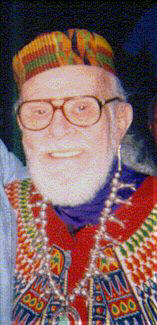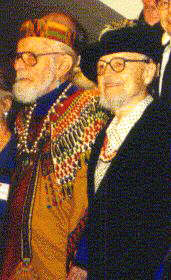 |


|
|
By Paul D. Cain
Paul D. Cain, the author of this true-life episode is presently completing a unique book of interviews and portraits of famous gay artists, activists, and celebrities. While, as he says, he admires Harry Hay greatly, he tells here about an unsettling exchange with the revered West Coast gay movement pioneer. Cain's forthcoming work reflects an incisiveness, sensitivity and honesty much needed by interviewers and biographers, qualities also reflected in his thoughts that follow. Jack Nichols
From my Sicilian heritage, I was treated to respect my elders (at age 36 I still call people "sir" and "ma'am"), and am often appalled by the lack of respect shown to senior citizens. When the situation arose I knew it would be unpleasant, but it certainly was never my intention to disturb him. However, when Harry asked me a question, I chose to speak the truth about something I considered innocuous. And I may never forget it. Harry was brought in as a guest speaker at Phoenix's local book store, Obelisk, on June 20, 1997. Of course, I trotted myself down to hear him speak, and to have him sign my hardback copy of his book, Radically Gay, from which he was reading. (As it turned out, I believe I had the only hardback copy in the room that evening, which initially seemed to please him.) After he was introduced, gave a short lecture, and fielded questions from the audience, it was time to meet Harry and have him sign the book.
While I agreed with many things and disagreed with others during his lecture, I hoped he would not ask me what I thought of his talk (he didn't). When I reached the front of the line, I told Harry, when he attempted to shake my hand, that I had met him almost two years ago, and that at that time he had told me that handshakes were for when one meets the Mayor; he preferred to be kissed. With that, I kissed him, and hoped we were on track. Earlier, Harry had requested that people write down what they wanted inscribed in their books, and I wrote, "To Paul--Best of luck on your book. Harry Hay." At first he was confused, thinking I meant best of luck on his book, but we soon straightened that out. I briefly explained as he wrote the dedication that I was writing a book of profiles on American gay men and lesbians. As he finished the inscribing, he looked at me and asked, "You won't be including bisexuals, now, will you?" "Oh no," I agonized, "not this!" Here was an issue I had hardly expected to tangle with Hay. I have never had a sexual experience with a woman; Harry was married for 13 years, and his longtime companion, John Burnside, had been married even longer than that. Suddenly I, a Kinsey 6, was going to go to the mat to defend bisexuality against someone who could arguably be called bisexual (at least in his actions) himself! Given the way the question was phrased, I knew I would incur his wrath if I answered truthfully. But I really had no choice; I don't lie to anyone, particularly when asked a direct question, and I refused to patronize Harry by telling him what he wanted to hear. So I looked him in the eye and said, "Yes, Harry, some of the profiles will be about bisexuals." He stared at me for a moment, and instantly became furious. Raising his voice slightly, he said, "You're making a terrible mistake." Quietly, my heart in my throat and my eyes directly upon his, I told him, "Harry I disagree." Well, that cut it. Raising his voice again (and somewhat perplexed) he told me, "Well, in that case, I can't let this inscription stand." He took his pen and began to scratch out the simple line he had just written at my request, defacing the only hardcover copy of his book in the place.
"Shame! Oh, but how I disagree with your actions toward Harry Hay! You seem to have lost all sense of manners in your treatment of someone who has meant so much to and done so much for your community ... Many of us may and probably do disapprove of the actions and goals of others, yet we must learn that we shall never attain peaceful coexistence until we develop understanding and tolerance within our own community." Because Harry apparently cannot respect bisexuals, he couldn't respect me, a gay man, who refused to exclude bisexuals from my book or from my life. A bisexual acquaintance who overheard the exchange told me how proud he was of what I did, and how much what I said meant to him. At the time I didn't know Ron was bi, and it wouldn't have mattered if I had known; Harry, who had spent much of his time that evening lecturing about gay men and lesbians bringing our unique gifts to the table from which heterosexuals could learn--like the art of consensus instead of voting under Robert's Rules in organizations--wasn't about to come to any consensus with me. That was OK from where I stood--I wasn't going to attempt to force Harry to agree with me--but I wasn't going to back down from my belief that no one was going to tell me what to put or what not to put in my book, any more than I would have deigned to tell him what to put or not to put in his. While writing this piece, it dawned on me that June 1997 was the thirteenth anniversary of my coming out as openly gay. In the Jewish faith, a bar/bat mitzvah is the day around one's thirteenth birthday on which an adolescent and his/her family celebrate passage into adulthood. I grew up Catholic, and have been a devout MCCer since 1984, but I suppose it was on June 20, 1997 that I truly became a man. |

© 1997-99 BEI
 Harry Hay
Harry Hay  Harry Hay and John Burnside, his lover
Harry Hay and John Burnside, his lover